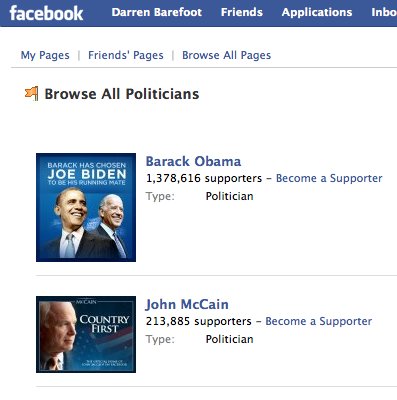MA Thesis: The 'Good,' the Bad and the Ugly
Posted in The Gnovis Blog
I’m a couple months away from my MA thesis deadline and, naturally, I change my central question as often as I do my underwear – maybe more so. The latest question has spiraled into a number of unmanageable sub-questions, and the unlimited Sangria brunch I consumed on Saturday failed to bring me any steps closer to answering them (though I did manage to pen a rather unintelligible paragraph or two when I got home). So I’d like to pose the most pressing of these questions to gnovis.

The last transition I made from my focal question jumped from 1) Who does Facebook political campaigns benefit – the right, left, or neither?… to 2) Is Facebook good for a democracy. But here’s my conundrum: Facebook, the text so to speak, is easily defined; democracy can be defined through ideology but “good,” well, is not. If one were to assert that Facebook is “good” for democracy, one would have to believe that democracy is at its best when more participants are involved in the process. Or would they?
Why do we so quickly assume that civic engagement, specifically political participation, is “good” for our country? Clearly the founding fathers didn’t think so, with their championing of the Electoral College. Were they privy to something we aren’t, or simply white elitists who were untrusting of the electorate?
Does a low voter turnout serve our country better than having ill-informed voters take to the polls simply out of civic duty? Based on the outcome of the 2000 and 2004 election, I’d say low voter turnout is not “good” for democracy, yet I do remain skeptical about Americans making the right choices. According to Louis Menand, voting is really about the intangibles and civic engagement is rather meaningless because we cast our votes based on asinine, subconscious non-issue related reasons. Besides, who isn’t to say that perhaps the small group taking to the polls represents the uninformed ones, while those following politics are too jaded to participate in the process?
Let’s take American Idol, for example, since it seems to be the only thing that can mobilize the masses to vote in this country. The American people selected past winners Ruben Studdard, Taylor Hicks and Jordin Sparks who have all been outsold by runner-ups. Silly comparison, I know, but it shows that taste is subjective and a high level of participation may not always yield the right decision (though it should be noted that people can vote more than once). And this holds true for the election process as well.
If by “good” for democracy, we mean that Facebook increases the flow of political information, provides a convenient way to campaign, improves political debate/deliberations among citizens and encourages offline participation, then I feel a strong case is to be made.
But if I am to prove Facebook is “good” for the democratic process, do I also buy into the notion that civic engagement – and more of it – is “good” for the outcome of our elections? What is “good” for the process may not necessarily be “good” for the results. Perhaps I should try accepting that “good” for the process and “good” for the outcome might not be one in the same.
